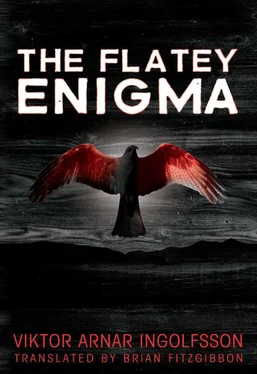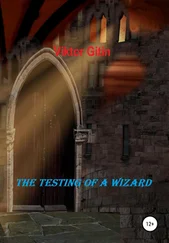Viktor Ingolfsson - The Flatey Enigma
Здесь есть возможность читать онлайн «Viktor Ingolfsson - The Flatey Enigma» весь текст электронной книги совершенно бесплатно (целиком полную версию без сокращений). В некоторых случаях можно слушать аудио, скачать через торрент в формате fb2 и присутствует краткое содержание. Жанр: Триллер, на английском языке. Описание произведения, (предисловие) а так же отзывы посетителей доступны на портале библиотеки ЛибКат.
- Название:The Flatey Enigma
- Автор:
- Жанр:
- Год:неизвестен
- ISBN:нет данных
- Рейтинг книги:5 / 5. Голосов: 1
-
Избранное:Добавить в избранное
- Отзывы:
-
Ваша оценка:
- 100
- 1
- 2
- 3
- 4
- 5
The Flatey Enigma: краткое содержание, описание и аннотация
Предлагаем к чтению аннотацию, описание, краткое содержание или предисловие (зависит от того, что написал сам автор книги «The Flatey Enigma»). Если вы не нашли необходимую информацию о книге — напишите в комментариях, мы постараемся отыскать её.
The Flatey Enigma — читать онлайн бесплатно полную книгу (весь текст) целиком
Ниже представлен текст книги, разбитый по страницам. Система сохранения места последней прочитанной страницы, позволяет с удобством читать онлайн бесплатно книгу «The Flatey Enigma», без необходимости каждый раз заново искать на чём Вы остановились. Поставьте закладку, и сможете в любой момент перейти на страницу, на которой закончили чтение.
Интервал:
Закладка:
Viktor Arnar Ingolfsson
The Flatey Enigma
CHAPTER 1
Wednesday, June 1, 1960
An easterly wind swept across Breidafjordur with the break of dawn, and a sharp spring breeze intensified the foam of the waves breaking on the strait between the Western Isles. A determined puffin flew low, skimming the surface of the waves at high speed, and an inquisitive sea raven stretched its wings on a reef. Black guillemots plunged into the ocean, while knowing seagulls circled the air high above, scanning the horizon for food. The whole of creation in the fjord was ablaze with life and alertness in the glaring morning sun.
A small but sturdy motorboat tackled the choppy waves and moved away from the island of Flatey toward the south. The small vessel was a converted old rowboat and tarred in black, with its name painted on the stern in large white letters: RAVEN. It carried a crew of three: a young boy, a grown man, and another, who was considerably older. Three generations from a small croft called Ystakot, on the western corner of the island of Flatey.
Jon Ferdinand, the eldest, sat at the stern, steering. White stubble sprouted from his hollow face, and black snuff trickled out of his wide nostrils. Some tufts of gray hair spilled out of his old peaked cap, groping for his face in the wind. His big and rawboned hand held the tiller, as the old eyes under his bushy eyebrows searched for a little island in the south. It wasn’t such an easy course to sail, even though visibility was good. Islets and skerries were scattered across the horizon before the mainland, beyond which lay the Dalafjoll mountains in the blue dusk.
Jon Ferdinand steered the boat head-on against the largest waves but held his course in the gaps between them. It was a small vessel, so it could be unpleasant if the waves hit the side of the boat directly. But the old man sailed by his instincts and seemed to enjoy this duel with the sea.
Gudvaldur, the steersman’s son, sat down on the thwart in front of the engine bay, smoking a pipe and sharpening a large pocketknife. Bareheaded, in a thick woolen sweater, he turned away with his pipe to avoid the spray of the waves that occasionally splashed over the gunwale. He had a weather-beaten face and a rugged expression and was blind in his left eye, following an injury to the eyeball that had whitened as it healed. The other eye was pitch black. Gudvaldur was named after a long-dead ancestor who had visited his mother in a dream, but locals normally just called him Valdi and associated him with the croft of Ystakot in Flatey.
A freak high wave broke over the boat, splashing the curly hair on the back of Valdi’s neck. He looked up and scanned ahead. “Careful, Dad,” he barked. “Don’t forget it’s Ketilsey were going to; you’re heading too far south.”
The old man smiled, flashing his few yellow teeth and raw gums.
“Too far south, too far south,” he repeated in his husky voice, turning the boat against the wave, and Valdi resumed smoking his pipe and fiddling with his knife once he saw they were back on course again.
Little Nonni Gudvaldsson sat on a folded sail at the bow, clinging to the gunwale with both hands. He was feeling cold and seasick, and although he was well used to the sea and didn’t normally allow the chill and queasiness to get to him, this was worse than usual because of his urgent, unseamanlike need to empty his bowels. Nonni had been late that morning and forgot to visit the outhouse before they left. He made no mention of this to his father because Valdi would just have told him to squat over the gunwale and do it right there. The boy didn’t fancy that in these rough waters. Every now and then he stretched his head over the stern to see if they were drawing any closer to their destination, but the boat seemed to be taking forever. Then he lay on the folded sail again, pigheadedly bit his lip, and tried to contract the muscles of his anus. Shutting his eyes tight, he muttered to himself over and over: “For Christ’s sake, Jesus, for Christ’s sake, don’t let me shit in my pants today.”
He glanced toward the front of the boat again.
“Dad, Dad,” he called out, “Grandpa’s forgetting himself again.”
Valdi looked up and turned to the old man. “You’re veering too far east. We’re going to Ketilsey, remember? Seal hunting.”
The old man seemed bewildered a moment but then regained his focus. He wrestled with another wave and headed straight for the island, which was now just a short distance away. Then he looked at Valdi, muttering an old refrain: “To Ketilsey the men did row, to catch the sixteen seals.”
Valdi didn’t answer, stuck his knife back into his pocket, and emptied his pipe on the gunwale. Then he moved back to the stern.
The tide was out at the island, and the landing toward the south was well sheltered. Valdi took command of the boat now and Jon Ferdinand waited, ready with a small anchor dangling from a long chain. The boat broke a wave, which crashed on the rocks, and Valdi turned the engine off as the old man dropped the anchor. The chain slid overboard with a rattle, and shrieking birds shot into the air from the island. A seal surfaced a short distance away before suddenly vanishing into the depths again. Little Nonni stood ready at the stern, and as soon as the anchor had steadied the boat, he managed to grab a bulky, rusty iron ring hanging from the rock, and to slip the rope through it and fasten it. Hopping onto the boat again, he stretched over to grab a pile of old newspapers from the place where they were kept under the cover of the engine bay. Valdi watched the boy leap off the boat and disappear behind the rock.
“I’ve told you many times before not to shit on the island,” he growled. “The seals will pick up your scent for weeks.”
Little Nonni felt a tinge of guilt. This was one of the golden rules of seal hunting, but he couldn’t help it. He ran up the island, found a good spot between the rocks, and yanked down his pants. The relief was immense, and he started to look around now. Natural monoliths formed a sheltered alcove, and two eider ducks lay brooding a short distance away. They were perfectly still, and only a trained eye would have been able to distinguish them from the turf. A sea pie perched on a rock and screeched loudly. His nest was probably close by on the edge of the shore. Further on, under a mighty boulder, lay the carcass of a large animal.
Nonni had often seen things like this on the shore, small whales, fat gray seals, or the bloated carcass of an old sheep. The novelty of this specimen, though, was that it was dressed in a green parka.
“Tell me about the Flatey Book,” he asked.
She pondered a moment. “Do you want to hear the long story or the short one?” she finally asked.
“The longer story if you have the time.”
She gazed through the window where the sun was setting behind the mountains in the northwest and said in a soft voice, “I’ve got plenty of time now.”
CHAPTER 2
Thursday, June 2, 1960
The mail boat sailed from Stykkisholmur to the island of Flatey once a week, on Saturdays, and then traveled on to Bardastrond north of Breidafjordur. The wharf was in Brjansl?kur, and it was there that the few farmers who inhabited the roadless fjords to the east of it came to collect their mail. Transport was limited in these parts, and the vast differences between the tides made sea travel there very difficult.
Once a road had been built over Kleifaheidi, there was far greater access to Patreksfjordur in the west and the villages to the north of it. A growing number of passengers started to travel on the mail boat, which increased its transportation of goods.
The boat followed the same route back from Brjansl?kur, stopping off in Flatey on the way and terminating its journey in Stykkisholmur. The whole trip took an entire day, and it was often in the small hours that the boat was finally tied to the wharf of its home harbor.
Читать дальшеИнтервал:
Закладка:
Похожие книги на «The Flatey Enigma»
Представляем Вашему вниманию похожие книги на «The Flatey Enigma» списком для выбора. Мы отобрали схожую по названию и смыслу литературу в надежде предоставить читателям больше вариантов отыскать новые, интересные, ещё непрочитанные произведения.
Обсуждение, отзывы о книге «The Flatey Enigma» и просто собственные мнения читателей. Оставьте ваши комментарии, напишите, что Вы думаете о произведении, его смысле или главных героях. Укажите что конкретно понравилось, а что нет, и почему Вы так считаете.











